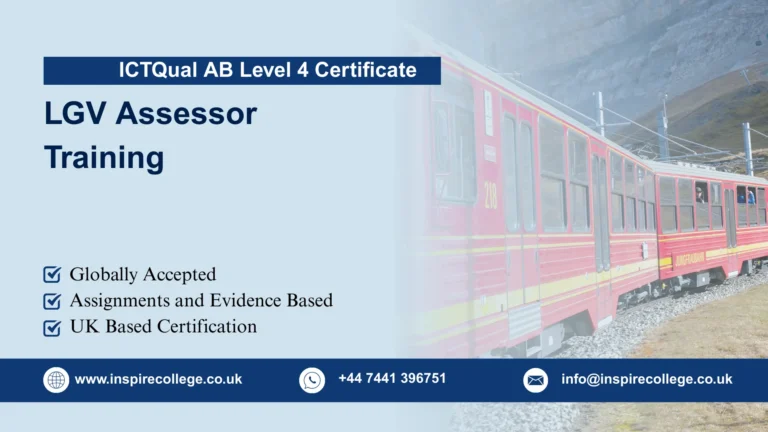
ICTQual Level 6 Diploma in Electrical Engineering 360 Credits – Three Years
The ICTQual Level 6 Diploma in Electrical Engineering is a comprehensive program designed to equip learners with advanced expertise in one of the most critical and dynamic fields of modern technology. Electrical engineering underpins the functionality of industries, infrastructure, and emerging technologies, making skilled professionals highly sought after in both local and global markets. This program is tailored for both freshers seeking a strong foundation and professionals aiming to enhance their technical knowledge and career prospects.
Spanning three years and carrying 360 credits, this diploma offers a structured pathway to mastering the principles, practices, and innovations in electrical engineering. The curriculum covers a wide range of topics including circuit design, power systems, control systems, electronics, instrumentation, and sustainable energy solutions. Learners will gain both theoretical knowledge and practical skills, ensuring they can confidently apply engineering concepts in real-world scenarios.
Throughout the course, emphasis is placed on developing problem-solving abilities, critical thinking, and technical proficiency. Students will engage in hands-on projects, laboratory work, and industry-relevant case studies, preparing them for roles in engineering design, installation, maintenance, and research. Additionally, the program fosters leadership, project management, and innovation skills, enabling graduates to contribute effectively to multidisciplinary teams and complex engineering projects.
By completing the ICTQual Level 6 Diploma in Electrical Engineering, learners will achieve a recognized qualification that opens doors to advanced career opportunities, higher education pathways, and professional certifications in the electrical engineering sector. This diploma ensures graduates are well-prepared to meet the challenges of a rapidly evolving technological landscape.
To ensure learners are fully prepared for the rigor and depth of the ICTQual Level 6 Diploma in Electrical Engineering, specific entry requirements must be met. These requirements ensure students have the foundational knowledge, skills, and language proficiency necessary to succeed in this advanced program. This course is ideal for both freshers and professionals seeking to advance their careers in electrical engineering or related fields.
Age Requirements
- Applicants must be at least 18 years of age at the time of enrollment.
Educational Requirements
- Completion of a Level 5 or equivalent diploma in Electrical Engineering or related fields.
- Applicants with strong mathematics and science backgrounds may also be considered.
- For freshers, completion of secondary education (A-levels, high school diploma, or equivalent) with relevant STEM subjects is recommended.
Professional Experience
- Professionals with at least 2–3 years of verifiable work experience in electrical engineering, electronics, or related technical fields may be eligible for direct enrollment.
- Practical experience in industrial or commercial electrical systems is advantageous but not mandatory for fresh learners.
English Language Proficiency
- Applicants whose first language is not English must demonstrate proficiency through recognized tests such as IELTS (minimum 5.5 overall), TOEFL, or equivalent.
- Competency in reading, writing, and understanding technical terminology in English is essential for successful course completion.
By meeting these entry requirements, learners will be well-positioned to fully engage with the ICTQual Level 6 Diploma in Electrical Engineering, develop advanced technical skills, and progress toward professional and academic excellence in the engineering sector.
Mandatory Units
This qualification, the ICTQual AB Level 6 International Diploma in Petroleum Engineering 360 Credits – Three Years, consists of 36 mandatory units.
Year 1: Foundational Knowledge
- Engineering Mathematics I
- Fundamentals of Electrical Circuits
- Principles of Electronics
- Digital Logic Design
- Electrical Machines and Transformers
- Introduction to Control Systems
- Engineering Drawing and CAD
- Introduction to Microprocessors and Microcontrollers
- Electrical Measurement and Instrumentation
- Physics for Engineers
- Health and Safety in Engineering
- Sustainability in Electrical Engineering
Year 2: Intermediate Proficiency
- Engineering Mathematics II
- Power Systems Analysis
- Analog Electronics
- Embedded Systems and Applications
- Electrical Energy Systems
- Signals and Systems
- Principles of Automation and Robotics
- Industrial Electronics
- Communication Systems Engineering
- Renewable Energy Technologies
- Electrical Project Management
- Technical Report Writing and Research Methods
Year 3: Advanced Specialization and Application
- Advanced Power Electronics
- Smart Grid Technology
- Electrical Machine Design
- Advanced Control Systems
- High Voltage Engineering
- Instrumentation and Process Control
- Advanced Embedded Systems
- Energy Storage and Conversion Systems
- Wireless and Optical Communication
- Electromagnetic Compatibility
- Capstone Project
- Professional Development and Ethical Practices
The ICTQual Level 6 Diploma in Electrical Engineering is designed to equip learners with advanced knowledge, practical skills, and professional competencies required in the dynamic field of electrical engineering. Upon completion of this three-year program, learners will demonstrate both theoretical mastery and practical application in diverse engineering environments, preparing them for professional roles or further academic pursuits.
Year 1: Foundational Knowledge
Engineering Mathematics I
- Apply algebra, calculus, and differential equations to solve engineering problems.
- Interpret and analyze mathematical models relevant to electrical systems.
- Develop problem-solving skills through quantitative analysis.
- Use mathematical software tools to perform computations accurately.
Fundamentals of Electrical Circuits
- Understand Ohm’s Law, Kirchhoff’s Laws, and circuit theorems.
- Analyze DC and AC circuits using systematic methods.
- Apply circuit analysis techniques to solve real-world engineering problems.
- Measure electrical parameters using standard instruments.
Principles of Electronics
- Identify and describe the operation of basic electronic components.
- Design simple electronic circuits for signal amplification and processing.
- Apply semiconductor theory to practical devices.
- Evaluate circuit performance through testing and simulation.
Digital Logic Design
- Understand binary systems, logic gates, and combinational circuits.
- Design and implement sequential circuits, flip-flops, and counters.
- Analyze digital systems using Boolean algebra.
- Use simulation software for digital circuit verification.
Electrical Machines and Transformers
- Explain the principles of operation of AC and DC machines.
- Analyze performance characteristics of transformers and motors.
- Conduct practical experiments to test machine parameters.
- Apply electrical machine knowledge to basic industrial applications.
Introduction to Control Systems
- Understand open-loop and closed-loop control concepts.
- Model and analyze dynamic systems using transfer functions.
- Develop basic control strategies for simple engineering processes.
- Use simulation tools to test control system designs.
Engineering Drawing and CAD
- Interpret and produce technical drawings with accuracy.
- Use CAD software to create electrical schematics and layouts.
- Apply standards for dimensioning and tolerancing.
- Translate theoretical designs into practical drawings.
Introduction to Microprocessors and Microcontrollers
- Explain the architecture and operation of microprocessors and microcontrollers.
- Write simple programs for microcontroller-based applications.
- Interface sensors and actuators for basic embedded systems.
- Troubleshoot and debug microcontroller circuits.
Electrical Measurement and Instrumentation
- Select and use instruments to measure voltage, current, resistance, and power.
- Understand sensor operation and data acquisition techniques.
- Analyze measurement errors and improve accuracy.
- Apply instrumentation knowledge in laboratory experiments.
Physics for Engineers
- Apply principles of mechanics, electromagnetism, and thermodynamics.
- Understand material properties relevant to electrical engineering.
- Solve engineering problems using fundamental physics concepts.
- Demonstrate physics principles through practical experiments.
Health and Safety in Engineering
- Identify hazards and implement safe working practices.
- Understand regulations and standards in electrical engineering.
- Apply risk assessment and safety protocols in practical settings.
- Promote a culture of workplace safety.
Sustainability in Electrical Engineering
- Recognize the environmental impact of electrical systems.
- Analyze energy-efficient technologies and practices.
- Apply sustainability principles in engineering designs.
- Advocate for renewable and eco-friendly solutions in projects.
Year 2: Intermediate Proficiency
Engineering Mathematics II
- Solve complex differential equations and linear algebra problems.
- Apply Fourier and Laplace transforms in system analysis.
- Model and simulate engineering phenomena mathematically.
- Use computational tools for advanced problem-solving.
Power Systems Analysis
- Analyze generation, transmission, and distribution systems.
- Evaluate power system stability and performance.
- Conduct load flow and fault analysis using software tools.
- Propose solutions for efficient energy delivery.
Analog Electronics
- Design and analyze amplifier circuits.
- Apply analog signal processing techniques.
- Use operational amplifiers in real-world applications.
- Evaluate circuit performance through laboratory testing.
Embedded Systems and Applications
- Develop embedded solutions for engineering problems.
- Program microcontrollers for automation tasks.
- Integrate hardware and software components efficiently.
- Test and troubleshoot embedded systems.
Electrical Energy Systems
- Understand principles of energy conversion and storage.
- Analyze electrical power generation methods.
- Evaluate system efficiency and reliability.
- Apply energy management practices in engineering projects.
Signals and Systems
- Analyze continuous and discrete signals mathematically.
- Model systems using Laplace and Z-transforms.
- Apply filtering and modulation techniques.
- Use software tools for signal processing applications.
Principles of Automation and Robotics
- Understand fundamentals of automated systems and robotics.
- Design and simulate basic robotic systems.
- Apply sensors and actuators in control applications.
- Evaluate automation systems for performance and efficiency.
Industrial Electronics
- Analyze and design industrial control circuits.
- Apply power electronics for motor control and drives.
- Conduct fault diagnosis in industrial systems.
- Implement practical solutions for industrial automation.
Communication Systems Engineering
- Understand analog and digital communication principles.
- Analyze modulation and demodulation techniques.
- Design basic communication circuits.
- Evaluate system performance using software simulation.
Renewable Energy Technologies
- Assess solar, wind, and other renewable energy sources.
- Design small-scale renewable energy systems.
- Evaluate energy efficiency and sustainability.
- Implement practical renewable energy solutions.
Electrical Project Management
- Plan and manage engineering projects effectively.
- Understand budgeting, scheduling, and resource allocation.
- Apply project management tools and software.
- Evaluate project outcomes for quality and efficiency.
Technical Report Writing and Research Methods
- Develop clear and concise technical reports.
- Conduct structured research for engineering projects.
- Apply data analysis and documentation standards.
- Communicate technical findings effectively to diverse audiences.
Year 3: Advanced Specialization and Application
Advanced Power Electronics
- Design high-efficiency power electronic converters.
- Analyze switching devices and their applications.
- Implement circuits for industrial and renewable applications.
- Evaluate system performance and reliability.
Smart Grid Technology
- Understand smart grid architecture and components.
- Analyze energy distribution and demand management.
- Apply IoT and communication technologies in smart grids.
- Assess system efficiency and sustainability.
Electrical Machine Design
- Design and model electrical machines for industrial applications.
- Conduct performance simulations and optimization.
- Apply thermal and mechanical considerations in design.
- Evaluate prototype performance in practical tests.
Advanced Control Systems
- Develop multi-variable and adaptive control systems.
- Apply control theory to complex engineering problems.
- Use simulation tools for controller design and analysis.
- Implement real-world control applications.
High Voltage Engineering
- Understand insulation systems and high voltage phenomena.
- Analyze electrical breakdown and insulation coordination.
- Conduct high voltage testing safely.
- Apply knowledge to power transmission and distribution.
Instrumentation and Process Control
- Design control loops for industrial processes.
- Select appropriate sensors and actuators.
- Analyze system stability and accuracy.
- Implement process control strategies in labs and projects.
Advanced Embedded Systems
- Develop complex embedded applications for industry.
- Integrate microprocessors, sensors, and communication modules.
- Optimize software and hardware performance.
- Evaluate system reliability under practical conditions.
Energy Storage and Conversion Systems
- Analyze batteries, capacitors, and alternative storage systems.
- Design energy storage solutions for renewable and conventional grids.
- Evaluate efficiency, safety, and environmental impact.
- Implement practical energy management strategies.
Wireless and Optical Communication
- Understand principles of wireless and fiber optic systems.
- Design basic communication networks.
- Evaluate signal propagation and system performance.
- Apply technologies to modern communication challenges.
Electromagnetic Compatibility
- Analyze interference and compatibility issues in circuits.
- Design mitigation techniques for EMC compliance.
- Conduct EMC testing and evaluation.
- Apply standards in practical engineering designs.
Capstone Project
- Plan and execute a comprehensive electrical engineering project.
- Apply theoretical knowledge to practical engineering challenges.
- Document project development, testing, and outcomes.
- Demonstrate problem-solving, innovation, and project management skills.
Professional Development and Ethical Practices
- Apply professional and ethical standards in engineering practice.
- Develop leadership, teamwork, and communication skills.
- Engage in lifelong learning and professional growth.
- Evaluate social, environmental, and economic impacts of engineering solutions.
Upon successful completion of all 36 units, learners of the ICTQual Level 6 Diploma in Electrical Engineering will possess advanced knowledge, practical engineering skills, and professional competencies to excel in industry, research, and higher education. This structured progression ensures graduates are capable, confident, and globally competitive in the electrical engineering sector.
The ICTQual Level 6 Diploma in Electrical Engineering is designed for learners who are motivated, technically inclined, and seeking to advance their knowledge and career prospects in electrical engineering. The program is suitable for both freshers and experienced professionals aiming to acquire advanced skills and industry-recognized credentials.
Fresh Graduates and STEM Students
- Individuals who have completed secondary education, A-levels, or a Level 5 diploma in engineering or related fields.
- Learners seeking a structured pathway to gain advanced knowledge in electrical engineering.
Early-Career Professionals
- Professionals with 2–3 years of experience in electrical, electronic, or related technical roles.
- Those aiming to enhance technical skills, managerial capabilities, and project handling expertise.
Tech-Savvy and Practical Learners
- Individuals interested in applying theoretical knowledge through hands-on projects, simulations, and laboratory work.
- Learners keen on developing problem-solving, analytical, and design skills.
Ethical and Sustainability-Minded Engineers
- Learners committed to ethical engineering practices, safety standards, and sustainable technology solutions.
- Individuals seeking to contribute positively to environmentally responsible and socially impactful engineering projects.
Aspiring Leaders and Innovators
- Candidates aiming to take on leadership roles in engineering projects or teams.
- Learners looking to engage in innovation, research, and advanced technological applications.
This diploma program prepares learners to become competent, confident, and globally competitive electrical engineers, ready to excel in industry, research, and higher education opportunities.
We are an approved centre of ICTQual AB, and all learners must enrol with us to pursue the ICTQual Level 6 Diploma in Electrical Engineering 360 Credits – Three Years. This program offers tailored certification routes for both experienced professionals and fresh candidates to suit different backgrounds and career goals.
Route for Experienced Professionals
- Candidates must have at least 6 years of verifiable work experience in electrical engineering, electronics, or related technical roles
- Submit a detailed portfolio of work experience and professional achievements for evaluation
- Attend a short orientation session to understand the program structure and expectations
- Complete a set of targeted assignments demonstrating application of prior experience and technical knowledge
- Participate in practical assessments or project-based evaluations if required
- Upon successful assessment, receive the ICTQual Level 6 Diploma in Electrical Engineering
Route for Fresh Candidates
- Fresh learners or those with minimal professional experience must enrol and complete all 36 course assignments
- Attend all required lectures, laboratory sessions, and practical workshops over the three-year program
- Complete projects, case studies, and technical exercises designed to build theoretical and practical knowledge
- Undergo regular assessments and examinations throughout the program
- Submit a capstone project demonstrating comprehensive application of learning
- Receive the ICTQual Level 6 Diploma in Electrical Engineering upon successful completion
Both certification routes equip learners with a globally recognized qualification, preparing them for professional excellence in electrical engineering. Graduates gain practical skills in electrical circuits, power systems, embedded systems, and control systems, alongside managerial and project-handling expertise. Whether applying advanced design techniques, implementing automation solutions, or contributing to renewable energy projects, learners will emerge as competent and confident engineers ready for global opportunities.
Register Now
FAQs for ICTQual Level 6 Diploma in Electrical Engineering






